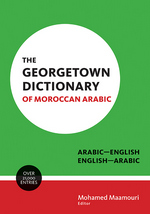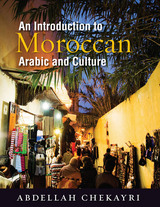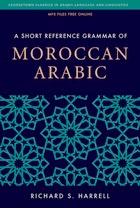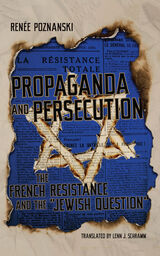
A Basic Course in Moroccan Arabic is a textbook in spoken Moroccan Arabic that is written for beginners who are unfamiliar with the Arabic language, alphabet, pronunciation, vocabulary, and grammar. Written in Latinate transcription it is carefully designed to present these elements in a progressive, user-friendly, step-by-step manner.
Following the initial pronunciation introductions and practice, there are 130 lessons consisting of a text where a small number of phrases and sentences illustrate grammatical points. These sections also contain exercises in new grammar and vocabulary. Each lesson is structured in a way that guides the learner naturally and comfortably into an understanding of the structure of Moroccan Arabic. From there, the course progresses into ninety-seven short, conversational dialogs that place the student in a variety of social situations.
First introduced to Arabic language students in the 1960s, A Basic Course in Moroccan Arabic still has no equal for clarity and ease of use. An audio CD of MP3 files that further aid and enhance the lessons is now bound into this volume.

This classic volume presents the core vocabulary of everyday life in Morocco—from the kitchen to the mosque, from the hardware store to the natural world of plants and animals. It contains myriad examples of usage, including formulaic phrases and idiomatic expressions. Understandable throughout the nation, it is based primarily on the standard dialect of Moroccans from the cities of Fez, Rabat, and Casablanca. All Arabic citations are in an English transcription, making it invaluable to English-speaking non-Arabists, travelers, and tourists—as well as being an important resource tool for students and scholars in the Arabic language-learning field.

The Georgetown Dictionary of Moroccan Arabic is a modernized language resource for learning and studying Moroccan Arabic that updates the pioneering Arabic dialect dictionary published by Georgetown University Press over fifty years ago. Students, teachers, and scholars of Arabic will welcome this upgraded resource, which includes key Moroccan words, to grow their vocabulary and learn more about Moroccan Arabic language and culture. Created using the latest computational linguistics approaches and tools, this etymological dictionary represents a new generation of Arabic language reference materials designed to help English speakers gain proficiency in colloquial Arabic dialects. Scholars and linguists are certain to find this complex and challenging dialect informative and useful in discussions of Arabic dialectology.
• Features over 13,000 Moroccan Arabic–English entries and 8,000 English–Arabic entries
• Provides entries in Arabic script and organized by root, as is standard in Arabic dictionaries
• Employs International Phonetic Alphabet (IPA) for all terms to demonstrate correct pronunciation and allow comparison across dialects
• Includes borrowed words commonly used in Moroccan Arabic, such as those from French, Spanish, and Amazigh
• Contains extensive example sentences and an appendix showing the roots of words with prefixes, both to help learners

An Introduction to Moroccan Arabic and Culture and the accompanying multimedia DVD are designed to enable students to communicate effectively using Moroccan Arabic. Since Moroccan Arabic is rarely written or used in formal communication, the strength of the book lies in training learners in speaking and listening skills that can be used in everyday situations.
Upon completing this course, students should be able to:• greet people• introduce themselves• ask and reply to simple questions• use days and numbers in context• order food• shop• make appointments and reservations• give directions• talk about future plans• use common idiomatic expressions
Each chapter includes:• cultural introductions to social, religious, or cultural aspects of Moroccan society• listening comprehension exercises• vocabulary exercises• dialogues and texts• conversation practice• grammar instruction on how native speakers structure their speech• interactive and video materials to support cultural understanding, listening, speaking, and grammar explanations
The book uses Romanized transcription alongside Arabic script for the first three chapters and thereafter only the Arabic script. It also includes a glossary and answer key. It requires approximately 120 contact hours, plus 180-240 additional hours of preparation outside class. A novice student should reach the intermediate-mid level of proficiency by the end of this course.

Conceived to be a practical reference grammar for those who may have basic skills in Moroccan Arabic, this classic volume teaches the phonology, morphology, and syntax of the dialect. Originally published in 1962, A Short Reference Grammar of Moroccan Arabic features the spoken language of the urban speakers of the northwestern part of Morocco, especially Fez, Rabat, and Casablanca. The Arabic has been transcribed for the English-speaking student.
The accompanying audio files, keyed to the text, demonstrate the pronunciation of the Arabic transcribed in the book. These mp3 files are available for free online at www.press.georgetown.edu.
READERS
Browse our collection.
PUBLISHERS
See BiblioVault's publisher services.
STUDENT SERVICES
Files for college accessibility offices.
UChicago Accessibility Resources
home | accessibility | search | about | contact us
BiblioVault ® 2001 - 2024
The University of Chicago Press









